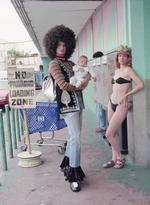K2's sitting here counting on the floor, and obviously not getting the whole base ten concept yet, because she asks, "Daddy, what comes after 29?" "What comes after 39?" every time.
And then suddenly, she doesn't mention 59, and she asks me, "Daddy, what comes after sixty ten?"
And I'm like, well, if she made it that far, do I tell her sixty eleven?
Because in French, that's what it is. There is no seventy-anything, it's sixty ten. And then eighty is four twenties, and ninety is four twenties ten.
Which all seems nuts to me, and makes me wonder how French people teach their kids to count? How do you explain those wacky exceptions? Is there a story there? Does it somehow make sense? Or do kids get told, c'est la vie, and that's just the way it is? Is there a classic moment where kids get baffled by the exceptions, or wonder why the system breaks down changes, and go, "septante, huitante, neuvante!" Are there rebels who keep using them? Is it adorable or unsettling? Does it make them sound like French hillbillies or Belgians?
OK, if the Academie Francaise is calling it one, we can agree that it's a "bizzarrerie". Which apparently has something to do with the Celts. But it still doesn't explain how you explain it to kids.
RSVP, please.
"une des bizarreries les plus célèbres de la langue française [academie-francaise.fr]




Hi Greg
Based on my experience with 3 kids, I can say that :
- yes, it's just the way it is. Actually this 'bizarrerie' is not so difficult to teach. The real challenge is to get a child to answer the 'what comes after 49 ?' question - just like you. Because logics are more difficult to catch than language oddities ?
- yes, this is Celtic heritage : our ancestors used to count in base 20, not in base 10
- yes, some folks do use 'normal" words (septante, octante, nonante), but they are no rebels, they are Belgian, or Swiss
Having taken French grades 5-13 (yes, lucky 13), I was reasonably competent with vocabulary, tenses, conjugation, gender, etc., but I never could get the hang of numbers en Francais.
The concept is difficult for didn't come across such system before.
It's much more common in Europa, and it's easy to explain as there are no preconception about how numbering "should be".
And thus, here come the quote :
"Danish also counts by units of twenty from 50 to 99. For example, the Danish word for 60 is tres (short for tresindstyve) which means 3 times 20, and 80 is firs (short for firsindstyve) which means 4 times 20.
Many other languages around the world also still use this vigesimal system (counting by twenty). In Welsh you can either count by twenties (preferred in Northern Wales) or by tens (preferred in Southern Wales). So 70 can be expressed as either deg ar thrigain (ten on three twenty) or saith deg (seven ten)."
More on this site :
http://www.languagesgalore.com/curious/numbers.htm